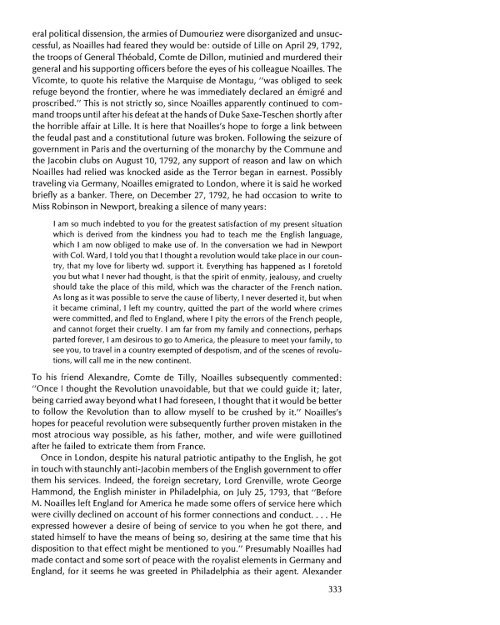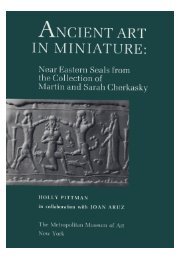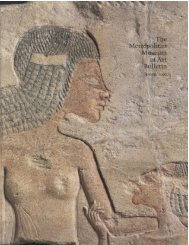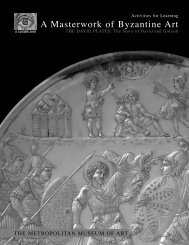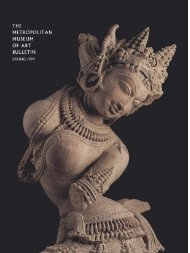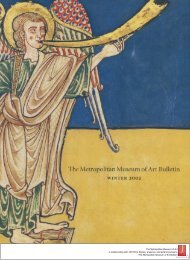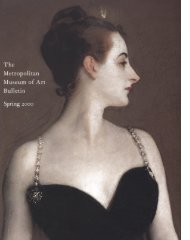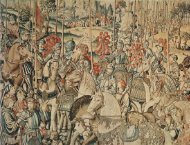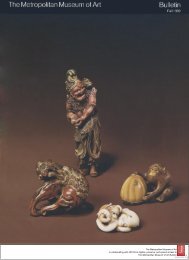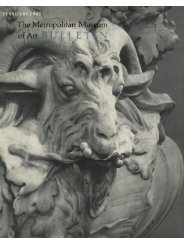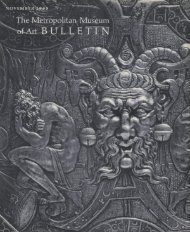The Metropolitan Museum of Art Bulletin, v. 29, no. 7 (March, 1971)
The Metropolitan Museum of Art Bulletin, v. 29, no. 7 (March, 1971)
The Metropolitan Museum of Art Bulletin, v. 29, no. 7 (March, 1971)
You also want an ePaper? Increase the reach of your titles
YUMPU automatically turns print PDFs into web optimized ePapers that Google loves.
eral political dissension, the armies <strong>of</strong> Dumouriez were disorganized and unsuccessful,<br />
as Noailles had feared they would be: outside <strong>of</strong> Lille on April <strong>29</strong>, 1792,<br />
the troops <strong>of</strong> General <strong>The</strong>obald, Comte de Dillon, mutinied and murdered their<br />
general and his supporting <strong>of</strong>ficers before the eyes <strong>of</strong> his colleague Noailles. <strong>The</strong><br />
Vicomte, to quote his relative the Marquise de Montagu, "was obliged to seek<br />
refuge beyond the frontier, where he was immediately declared an emigre and<br />
proscribed." This is <strong>no</strong>t strictly so, since Noailles apparently continued to command<br />
troops until after his defeat at the hands <strong>of</strong> Duke Saxe-Teschen shortly after<br />
the horrible affair at Lille. It is here that Noailles's hope to forge a link between<br />
the feudal past and a constitutional future was broken. Following the seizure <strong>of</strong><br />
government in Paris and the overturning <strong>of</strong> the monarchy by the Commune and<br />
the Jacobin clubs on August 10, 1792, any support <strong>of</strong> reason and law on which<br />
Noailles had relied was k<strong>no</strong>cked aside as the Terror began in earnest. Possibly<br />
traveling via Germany, Noailles emigrated to London, where it is said he worked<br />
briefly as a banker. <strong>The</strong>re, on December 27, 1792, he had occasion to write to<br />
Miss Robinson in Newport, breaking a silence <strong>of</strong> many years:<br />
I am so much indebted to you for the greatest satisfaction <strong>of</strong> my present situation<br />
which is derived from the kindness you had to teach me the English language,<br />
which I am <strong>no</strong>w obliged to make use <strong>of</strong>. In the conversation we had in Newport<br />
with Col. Ward, I told you that I thought a revolution would take place in our country,<br />
that my love for liberty wd. support it. Everything has happened as I foretold<br />
you but what I never had thought, is that the spirit <strong>of</strong> enmity, jealousy, and cruelty<br />
should take the place <strong>of</strong> this mild, which was the character <strong>of</strong> the French nation.<br />
As long as it was possible to serve the cause <strong>of</strong> liberty, I never deserted it, but when<br />
it became criminal, I left my country, quitted the part <strong>of</strong> the world where crimes<br />
were committed, and fled to England, where I pity the errors <strong>of</strong> the French people,<br />
and can<strong>no</strong>t forget their cruelty. I am far from my family and connections, perhaps<br />
parted forever, I am desirous to go to America, the pleasure to meet your family, to<br />
see you, to travel in a country exempted <strong>of</strong> despotism, and <strong>of</strong> the scenes <strong>of</strong> revolutions,<br />
will call me in the new continent.<br />
To his friend Alexandre, Comte de Tilly, Noailles subsequently commented:<br />
"Once I thought the Revolution unavoidable, but that we could guide it; later,<br />
being carried away beyond what I had foreseen, I thought that it would be better<br />
to follow the Revolution than to allow myself to be crushed by it." Noailles's<br />
hopes for peaceful revolution were subsequently further proven mistaken in the<br />
most atrocious way possible, as his father, mother, and wife were guillotined<br />
after he failed to extricate them from France.<br />
Once in London, despite his natural patriotic antipathy to the English, he got<br />
in touch with staunchly anti-Jacobin members <strong>of</strong> the English government to <strong>of</strong>fer<br />
them his services. Indeed, the foreign secretary, Lord Grenville, wrote George<br />
Hammond, the English minister in Philadelphia, on July 25, 1793, that "Before<br />
M. Noailles left England for America he made some <strong>of</strong>fers <strong>of</strong> service here which<br />
were civilly declined on account <strong>of</strong> his former connections and conduct.... He<br />
expressed however a desire <strong>of</strong> being <strong>of</strong> service to you when he got there, and<br />
stated himself to have the means <strong>of</strong> being so, desiring at the same time that his<br />
disposition to that effect might be mentioned to you." Presumably Noailles had<br />
made contact and some sort <strong>of</strong> peace with the royalist elements in Germany and<br />
England, for it seems he was greeted in Philadelphia as their agent. Alexander<br />
333


